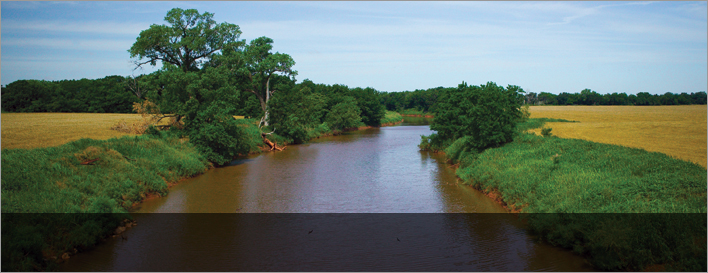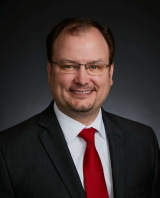Dr. Jason Vogel
Submitted by gina on Fri, 2020-07-17 08:48



EPSCoR Research Focus:
Variable & Marginal Quality Water Supplies 
Director, Oklahoma Water Survey | Professor
School of Civil Engineering & Environmental Science
University of Oklahoma
Spacer:
Please leave this field as it is.
Education:
B.S. | Biological Systems Engineering | University of Nebraska, Lincoln, NE | 1995
M.S. | Agricultural Engineering | Texas A&M University, College Station, TX | 1997
Ph.D. | Biosystems Engineering | Oklahoma State University, Stillwater, OK | 2001
Research Interests:
Dr. Jason Vogel is director of the Oklahoma Water Survey and a professor in the School of Civil Engineering and Environmental Science at the University of Oklahoma. He is a member of the OK NSF EPSCoR Track-1 RII Award titled Socially Sustainable Solutions for Water, Carbon, and Infrastructure Resilience in Oklahoma. The $20 million research project is a social science-led, multi-disciplinary collaboration among social, physical, biological, engineering, and computational scientists. More than thirty researchers from across the state are working together on the project, which began July 1, 2020.
For more than 25 years, Dr. Vogel’s research has focused on facilitating and developing solutions for water issues throughout the Great Plains, with a specialization in stormwater and stream management. Prior to joining the University of Oklahoma, he held faculty and research positions at Oklahoma State University in the Department of Biosystems and Agricultural Engineering and at the U.S. Geological Survey, respectively.
Dr. Vogel's work supports the OK NSF EPSCoR research project's Focus Area 3: Variable and Marginal Quality Water Supplies (V-MQW). The V-MQW Supplies focus area addresses issues surrounding Oklahoma’s water demands, which are projected to increase 600,000 acre-feet per year between 2007-2060. Reliable water supplies are needed to provide for these demands while meeting the state’s goal of capping freshwater use to 2010 levels. However, freshwater supplies are declining due to reservoir sedimentation and groundwater overdraft and are increasingly vulnerable to S2S variability. Concurrently, volumes of oil and gas ‘produced water,’ municipal wastewater, and stormwater are increasing with continued oil and gas development and urbanization. Disposal of produced waters has been correlated with seismicity, potentially impacting infrastructure and resulting in energy production curtailment in some regions. The challenge is finding a mix of solutions that allow Oklahoma’s diverse array of MQW to be economically treated for beneficial use to address water scarcity related to changing seasonal to sub-seasonal weather patterns, waste disposal, and infrastructure risk while supporting continued energy production and economic growth.
Key Publications:
- Vogel, Jason Robert, Daniel Eugene Storm, Billy J. Barfield, Wayne Ray Kiner, Karl Michael Garbrecht. Patent Number US9868648B2: Passive Chemical Dosing and Mixing Apparatus and Method. https://patents.google.com/patent/US9868648B2/en. Granted January 16, 2018.
- Kandel, S., J.R. Vogel, C. Penn, and G.O. Brown. 2017. Phosphorus Retention by Fly Ash Amended FilterMediain Aged Bioretention Cells.Water9(10):746. http://www.mdpi.com/2073-4441/9/10/746.
- Youngblood, S., Vogel, J.R, Brown, G.O, Storm, D.E., McLemore, A., & Kandel, S. 2017. Field Studies of Microbial Removal from Stormwater by Bioretention Cells with Fly-Ash Amendment. Water. 9 (7):526. http://www.mdpi.com/2073-4441/9/7/526.
- Vogel, J.R., T.L. Moore, R.R. Coffman, S.N. Rodie, S.L. Hutchinson, K.R. McDonough, A.J. McLemore, and J.T. McMaine. 2015. Critical Review of Technical Questions Facing Low Impact Development and Green Infrastructure: A Perspective from the Great Plains. Water Environment Research. 87(9):849-862. (invited critical review)
- Graves, G.M., J.R. Vogel, J.B. Belden, and E.J. Rebek. 2014. Investigation of Insecticide Leaching from Potted Nursery Stock and Aquatic Health Benefits of Bioretention Cells Receiving Nursery Runoff. Environmental Science and Pollution Research, 22:8801-8811. https://link.springer.com/article/10.1007%2Fs11356-014-2816-9.
- Vogel, J.R., Jingrang Lu, Dale Griffin, Hon Ip, M.T. Moser, Hodon Ryu, Nicholas Ashbolt, and J.W. Santo Domingo. 2013. Impacts of Migratory Sandhill Cranes (Grus canadensis) on Microbial Water Quality in the Central Platte River, Nebraska, USA.Water, Air, and Soil Pollution.226(6):1576. https://link.springer.com/article/10.1007%2Fs11270-013-1576-3.
- Vogel, J.R., J.E. Gilley, G.L. Cottrell, B.L. Woodbury, E.D. Berry, and R.A. Eigenberg, 2011. Transport of Trace Elements in Runoff from Unamended and Pond‐ash Amended Feedlot Surfaces.Transactions of theASABE.54(4):1269-1279. http://digitalcommons.unl.edu/biosysengfacpub/324/.
- Vogel, J.R., J.D. Frankforter, D.L. Rus, C.M. Hobza, and M.T. Moser, 2009. Water Quality of Combined Sewer Overflows, Stormwater, and Streams, Omaha, Nebraska, 2006-2007. U.S. Geological Survey Scientific Investigations Report 2009-5175, 152 p. https://pubs.usgs.gov/sir/2009/5175/pdf/SIR2009-5175.pdf.
- Vogel, J.R., M.S. Majewski, and P.D. Capel. 2008. Pesticides in Rain in Four Agricultural Watersheds in the United States.Journal of Environmental Quality 37:1101-1115. https://dl.sciencesocieties.org/publications/jeq/articles/37/3/1101.
- Vogel, J.R., D.M. Stoeckel, R.A Lamendella, R.B. Zelt, J.W. Santo Domingo, S.R. Walker, and D.B. Oerther. 2007. Identifying Fecal Sources in a Selected Catchment Reach Using Multiple Source-Tracking Tools. Journal of Environmental Quality, 36(3): 718-729, plus 4 p. online supplemental. https://dl.sciencesocieties.org/publications/jeq/articles/36/3/718.
Related Links:
Latest News
Wednesday, July 02, 2025
Monday, June 30, 2025
Monday, June 02, 2025
Upcoming Events
Monday, April 27, 2026 - 8:00am - Tuesday, April 28, 2026 - 12:00pm
Wednesday, September 23, 2026 - 9:00am - 5:00pm
